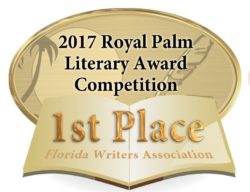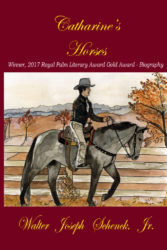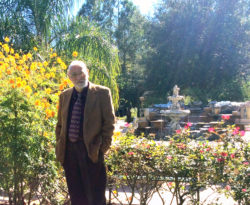
Published Biography
At the 2017 Royal Palm Literary Award Banquet, author Walter J. Schenck won First Place for his published biography, Catharine’s Horses. Each year at the RPLA Banquet, authors experience the joy of earning accolades for all the hard work that is often done in the privacy of the home with little to no recognition. We’re showcasing the best of the best with our First Place winners spotlight. Not only does RPLA recognize extraordinary talent, but we’re giving readers an opportunity to sample excerpts from the winning stories.
Catharine’s Horses

This is a poignant tale about a former rodeo champion’s memories of her childhood love for horses that she carried with her throughout her life.
Click here to read an excerpt from Catharine’s Horses.

Walter Joseph Schenck, Jr.
Walter Joseph Schenck has received quite a few critical acclaims, achieving Recommended Read List twice in Kirkus Reviews. He also achieved Featured Writer in Publisher’s Weekly, plus three awards from FAPA
Q: How do you decide what to use in your story? Where to start it?
A: I am strongly drawn toward biblical and family histories. At times I do venture into military issues. Perhaps, too realistically. I always use real locations and real-time-events, with an emphasis on accurate character developments with true voices. In my fictional writing, I create the dialogue as if it were actually spoken, mistakes and all. In nonfictional narrative writing, if the dialogue wasn’t spoken, it can never be written. In all my writing, I keep the locations true. If I wasn’t there, then I don’t pretend I was. The ambiance, the nuance is lost. In my historical writing, if the historical events cannot be supported, the storyline is discarded.
Often, I begin my novels with flashbacks. I like to use flashbacks within flashbacks, creating multiple encounters. I prefer to use stream-of-consciousness as I am able to explore and envelope my thematic overtures within the dynamics of a revolving storyline.
Q: Anything in particular about your award-winning RPLA entry that you’d like to share?
A: I was fortunate enough to have eleven aunts: four in the United States and seven in Costa Rica. Aunt Catharine, one of three still living, stands out from the others because she happened to have a massive business selling, training, breeding, and purchasing some rather remarkable horses. She and I got along as well as we did because we shared each other’s love for the outdoors. I also shared Floyd’s, her husband, love for work. I never complained. I always did what I was told, did it rapidly, did it thoroughly. Through both, I developed the methodology of detailed craftsmanship.
Q: Who do you credit with inspiring your writing?
A: My father. He also loved adventures. Hunting, traveling, exploring. Of course, horses. In fact, the very first story I ever wrote was about his last horse, which, for all practicality, became mine. After it died, we settled for dogs. Large dogs. The kind that growl so fiercely, intruders quake.
Q: Any tips for new writers?
A: Not only must you know your material, you must train yourself to see beyond it: an essence of capturing from its interior the exterior substance of mobility. To accomplish this, you must commit yourself to weeks and months of research. My first novel was written in two years. My second novel took me over three years. Nearly each day was filled with tiring research, verifications, examining the intricacies of words in relationship to the sentence, to the paragraph, to the establishment of final thoughts. For me, chronological, scientific, archaeological, and historic accuracies are musts.
Regardless how much research a writer performs, beware false material. A minimum of three sources must support each other. If one doesn’t, find out why. Sometimes my research had to be discarded because of authors who weren’t as careful, as mindful of what they wrote, as they should have been. To me, historic, religious, and archaeological material must be presented accurately. An author’s task is not to speculate, make up dates, or inject frivolous opinions. For me, experience is never enough. I often prefer scholarly dry writing to embellished writing as I live by facts.
This philosophy of thoroughness even applies to fiction. The wonder pills of lies, fantasy, and deceit still need to be researched for accuracy. Chronology must flow consistently. Science must seem real. Locations feasible. Plots and characters must be true to heart. A writer must develop a keen ear for dialogue. Listening, not talking, will flavor the results. The word “fiction” is not an excuse for clumsy. To touch another’s heart, one must be willing to first share heartfelt truths rendered in touchable frames.
A message about supporting literacy in Florida:
If every member of FWA went to Smile.Amazon.com, chose Florida Writers Foundation, Inc. as their charity and, instead of logging into Amazon.com, logged into Smile.Amazon.com, FWF would receive 0.5% of the purchase funds. Every time.
We could significantly fund the literacy efforts of our organization. No money out of your pockets…just some invested time to set this up.
How easy for us to make a difference. To see all of our work, please read the pages of our website www.floridawritersfoundation.com. You’ll be proud.
Melody Dean Dimick,
President, FWF
